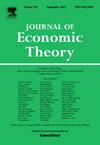基于拒绝的决策模型
IF 1.2
3区 经济学
Q3 ECONOMICS
引用次数: 0
摘要
本文介绍了一种基于拒绝程序的决策模型。从通过偏好最大化的标准选择模型出发,我们的模型中的决策者(DM)根据二元关系拒绝菜单中的最小选项。本文公理化地研究了具有不同合理性条件的非拒绝选择在二元关系上的对应关系。然后,我们推广我们的模型来研究由拒绝的迭代过程产生的对应关系。观察到经典的理性选择模型是该模型的一个特例,从而提供了选择最大集的程序描述。我们发现,本文提出的拒绝方法也可以解释决策理论中观察到的异常现象,如双诱饵效应或双妥协效应。本文章由计算机程序翻译,如有差异,请以英文原文为准。
A model of rejection-based decision making
This paper introduces a model of decision making based on a procedure of rejection. Departing from the standard model of choice via preference maximization, the decision maker (DM) in our model rejects minimal alternatives from a menu according to a binary relation. We axiomatically study the correspondence of non-rejected alternatives with different rationality conditions on the underlying binary relation. We then generalize our model to study correspondences generated by an iterative procedure of rejection. It is observed that the classical rational choice model is a special case of this model, thus providing a procedural description of selecting the maximal set. We find that the rejection approach developed in this paper can also explain anomalies observed in decision theory, such as the two-decoy effect or the two-compromise effect.
求助全文
通过发布文献求助,成功后即可免费获取论文全文。
去求助
来源期刊

Journal of Economic Theory
ECONOMICS-
CiteScore
2.50
自引率
12.50%
发文量
135
期刊介绍:
The Journal of Economic Theory publishes original research on economic theory and emphasizes the theoretical analysis of economic models, including the study of related mathematical techniques. JET is the leading journal in economic theory. It is also one of nine core journals in all of economics. Among these journals, the Journal of Economic Theory ranks fourth in impact-adjusted citations.
 求助内容:
求助内容: 应助结果提醒方式:
应助结果提醒方式:


